Recently, Raz sent in this image of cans of WD-40, part of their Collectible Military Series, for sale at an auto parts store:
The types of war-related advertising we see can give us insights about how average Americans are connected to, and affected by, different wars. During many U.S. wars, contributing to the war effort was the duty of every citizen; this is particularly apparent with World War II. The draft, the deployment of some 16 million Americans, and public calls to purchase war bonds and ration food meant that war was nearly everyone’s concern. In contrast, the current War on Terrorism mostly only impacts those connected directly to it—military families. There are no widespread calls to ration, buy war bonds, or otherwise support the war effort through employment, growing vegetables, saving scrap metal, or other changes to our daily lives. My own research shows that members of military families feel the war is ignored and forgotten by most Americans. They feel isolated in their daily anxieties and their efforts to support their loved ones.
Products like the WD-40 Collectible Military Series were more common during WWII than they are now. During WWII advertising used the war cause and feelings of patriotism to sell a wide range of products that, ads argued, would help the U.S. win. Some were clearly connected to the war effort:
With others, the connection was much less obvious or direct:
Both Shlitz and Camel donated to the war effort. Similarly, with their “Drop and Give Me 40” campaign, WD-40 is donating part of their profits to charities that support service members and their families:
For each can purchased from March 2011 through May 2011, WD-40 Company donated 10 cents to three charities that help active-duty military, wounded warriors, retired veterans and their families. On Memorial Day, WD-40 Company presented $100,000 checks to each of the following military charities: Armed Services YMCA, Wounded Warrior Project, and the Veterans Medical Research Foundation.
Although military-themed products (aside from “support the troops” t-shirts, stickers and pins that are widely available) are not as common as they were during WWII, some companies have come out with patriotic advertising.
Goodyear has “support the troops” tires, sold and marketed at NASCAR races:
An Anheuser-Busch commercial shows ordinary Americans stopping their everyday lives to thank the troops. There is no mention of the company until the very end, and nothing at all about beer:
American Airlines has a similar advertisement depicting various Americans being supportive the troops before and during their flight:
The messages in these recent ads are markedly different than the WWII messages of everyone taking part and working toward victory, reflecting changing relationships between war efforts and the average citizen. No reminder of the war was necessary in the 1940s—war was a part of everyday Americans’ lives. Current ads, like the WD-40 series, often serve less as a call to specific action than as a reminder that the war exists, as a reminder to thank the troops and support service members. It’s a different type of message for a different type of war, one that only involves a small fraction of Americans and is often largely invisible to everyone else.

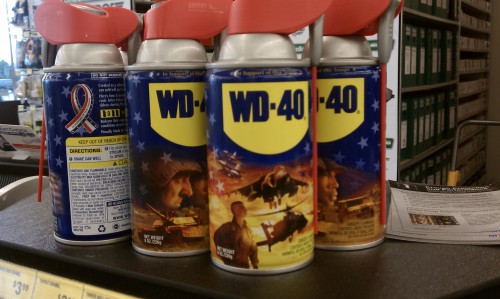
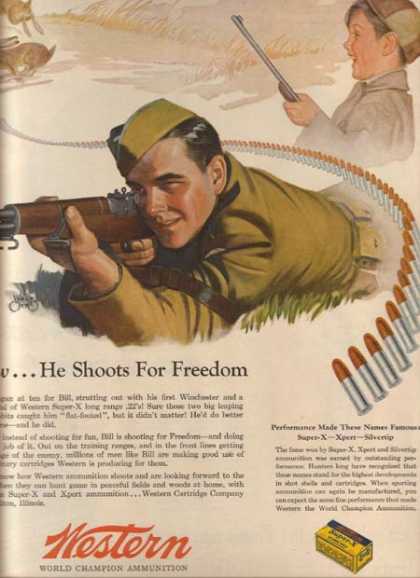
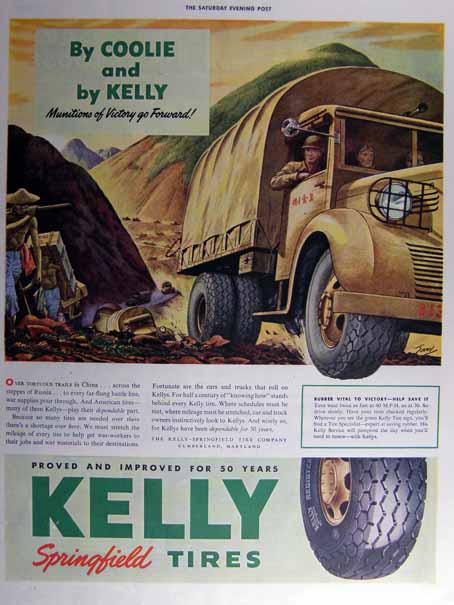
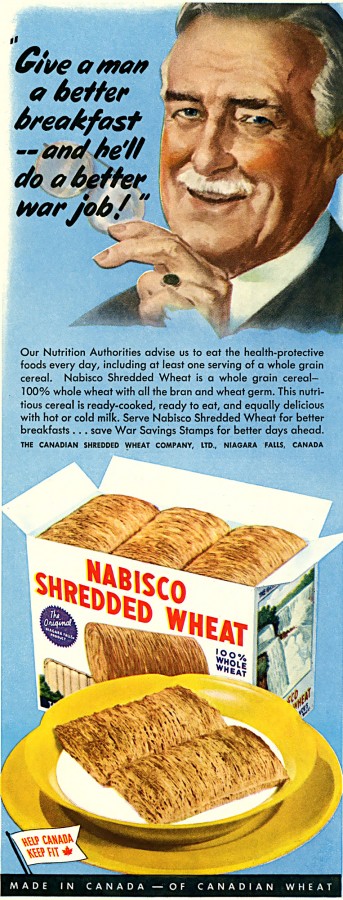
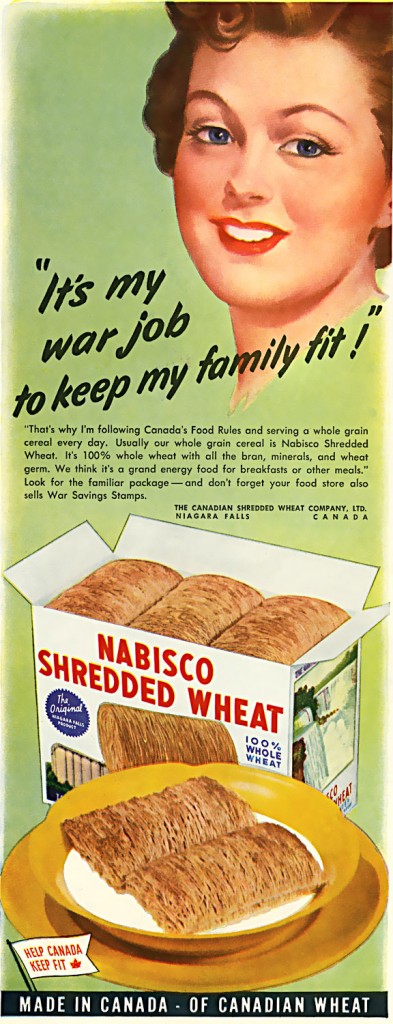
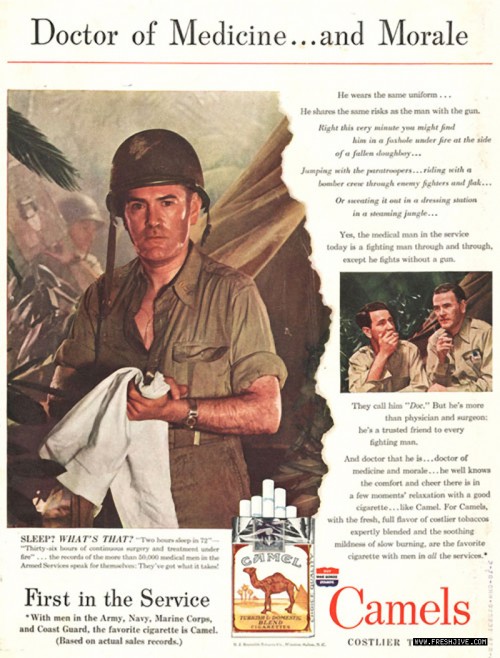
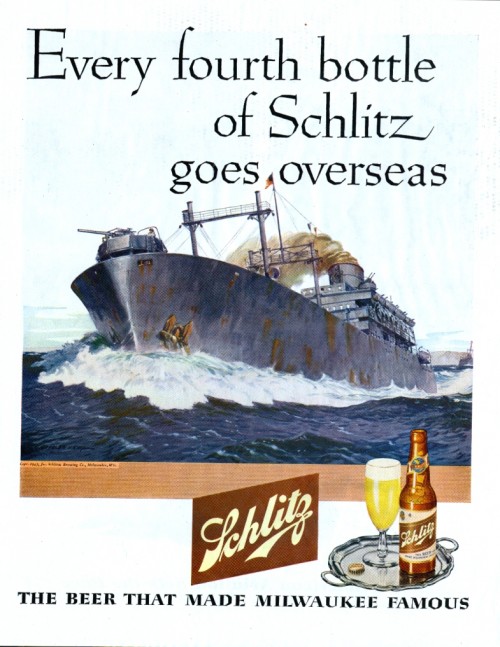
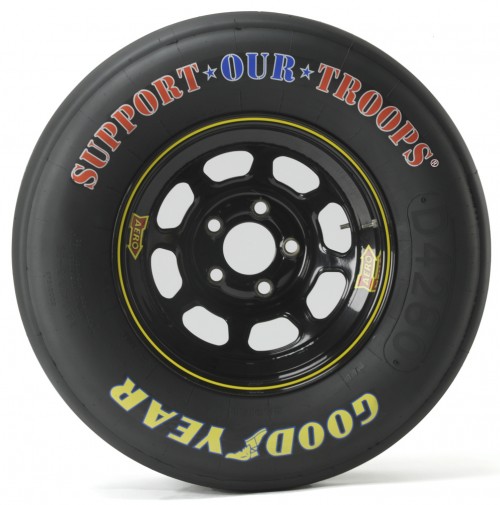
Comments 28
Samantha C. — September 16, 2011
Interesting as the point of the post really is, I'm more gobsmacked by the Shredded Wheat cereal being two giant....loaves, instead of the little squares I'm used to
Commodore Crush — September 16, 2011
These things are so weird. I don't get it, but I found something similar with dollar store lighters in the checkout line: http://blog.commodorecrush.com/index.php/2011/09/weird-operation-iraqi-freedom-dollar-store-lighters/
Gfgfgsj — September 16, 2011
"Patriotic adverstisement", newspeak for "propaganda".
Stevo — September 16, 2011
I always liked this one:
http://www.flickr.com/photos/sa_steve/4370908512/in/gallery-wiless-72157624436567861/
Ana — September 16, 2011
You state that "During many US wars..." and I would like to know what wars you are referencing. A major difference between WWII and current conflicts is the fact that we declared war in WWII and have not since. For no other conflict (Vietnam, Korea, Gulf War) have we mobilized the way we did for WWII, mainly because WWII was a war with a more intensive mobilization rather than a military action like the rest. Yes, we are using our military and yes, there is a certain amount of propaganda to sell products in both cases, but there the similarities end and I feel that specifically the second paragraph shows a serious lack of understanding of military history and war in the US.
C — September 16, 2011
This post is incomplete without this one: http://2.bp.blogspot.com/_XTmpRKhr-hw/THpDj_SqLMI/AAAAAAABkog/IGwzsZl8duA/s1600/crocodileskeepout1.jpg
Karen Rust — September 17, 2011
Capitalism at it's best...........
Cj199 — September 17, 2011
Monster has "military spec" cans decorated for a special group of loyal customers: http://www.bevnet.com/news/newswire/2011/cti-provides-military-decoration-to-monster-energy/
Adas — September 17, 2011
OIF vet here. Just wanted to say this crap makes me gag. They are using the blood of my fallen brothers and sisters to turn a buck. And those yellow ribbons are nothing more than a walking advertisement for apathy about the war. If people really supported the troops, they would be active in the political process that sends them to combat, instead of slapping a 2 dollar magnet on their SUV.
Anna Geletka — September 17, 2011
Perhaps this is cynical, but I suspect that the intentions of the manufacturers of these "war-themed" merchandise are more about profits than patriotism. I find most marketing campaigns like this to be crass - and that includes breast cancer themed products and other similar fundraising campaigns. A company can donate and support good causes without trying to earn a buck off a consumer whose heartstrings have been tugged by manipulative images.
And what do you do with a used up "collectible" can of WD-40? Stack it on the knick-knack shelf?
Monte A — September 18, 2011
It may be worth adding that many of our largest military contractors include companies like PepsiCo, thus creating yet another conflict of interest. The longer the USA remains in Afghanistan, for instance, the more money flows to their bottom lines. Adas, they're not only "using the blood of your fallen brothers and sisters to turn a buck," they're vested in keeping the blood flowing.
Korshi Dosoo — September 19, 2011
Just a question to people from the US - do troops actually get applauded at airports, or is that poetic license for the ad?
Anonymous — September 19, 2011
"the current War on Terrorism mostly only impacts those connected directly to it—military families"
What about the US citizens and residents imprisoned without charge on suspicion of "being terrorists", some of them subject to extraordinary rendition (aka kidnapping) and torture?
What about the US citizens prevented from flying for such offences as being members of the Green party?
What about the US citizens who get a visit from the FBI because someone overheard them criticize George Bush?
What about all the people outside the US maimed, killed, impoverished, and bereft of friends and family by the US "War on Terror"?
I know that the military is kind of like the matrix in the US, and even if you don't approve of the endless war it wages, you'll have been raised to accept it and to be sentimental about soldiers, but "mostly" doesn't begin to cover all the victims of the so-called War on Terror who you've rather callously left out here.
Using Patriotism and War to Sell Products – Sociological Images | Upstarta.biz — September 19, 2011
[...] http://thesocietypages.org/socimages/2011/09/16/united-we-buy-using-patriotism-and-war-to-sell-produ... [...]
Capt. aMeriCa — September 29, 2011
It is ironic that there is oil in the can, and we are fighting for oil.
Oh, I mean terrorisim.... sorry!
Iris Olson — October 3, 2011
This year i saw an ad for insurance i believe, and it was, i kid you not, a bunch of adorable interracial children singing to the firefighters who worked in NYC on 9/11. It was so emotionally manipulative and exploitative. and then at the end the company logo flashed.
Roundup – The Tiny Team « The Heat Death Hour — November 20, 2011
[...] United We Buy: Using Patriotism and War to Sell Products [Sociological Images] [...]
The Benefits of Adding a Canadian Theme to Your Business | HTT Signs Ltd. — September 28, 2012
[...] be over-the-top, garish, and disrespectful. For example, far too many companies have tried to take advantage of wars to sell products. However, if you show some restraint, you can both show genuine love and respect for your country [...]
The Benefits of Adding a Canadian Theme to Your Business | HTT Signs Ltd. — December 7, 2012
[...] be over-the-top, garish, and disrespectful. For example, far too many companies have tried to take advantage of wars to sell products. However, if you show some restraint, you can both show genuine love and respect for your [...]